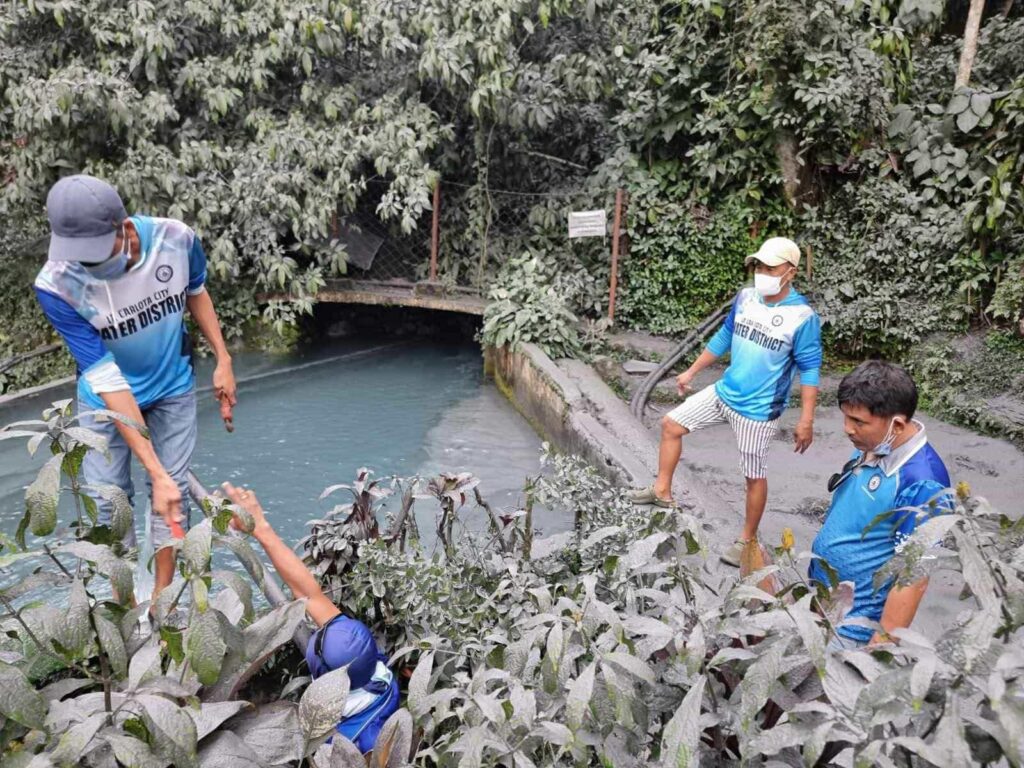Ashfall after Kanlaon’s eruption affects 26 areas

Following the eruption of Mt. Kanlaon, Guintubdan Spring in Negros Occidental was covered with ash. The Phivolcs has warned residents living near the volcano of ashfall after it emitted a three-kilometer plume last Monday, Dec. 9. | Photo from La Carlota Water District/Facebook
CEBU CITY, Philippines — At least 26 areas in Negros island were affected by ashfall following the eruption of Mt. Kanlaon last Monday, December 9.
In its latest report, the Philippine Institute of Volcanology and Seismology (Phivolcs), said that ash fall was reported in a wide area west of the volcano.
In Negros Occidental, these are Hinigaran, Valladolid, Pulupandan, Pontevedra, San Enrique, La Carlota, La Castellana, Murcia, and Bago City in Negros Occidental, and Canlaon City in Negros Oriental.
Areas in Western Visayas also suffered ashfall, Phivolcs added, and this was due to the west-southwest direction of the wind.
These areas included Tigbauan, Igbaras, Miag-ao, Oton, Guimbal, Pavia and Iloilo City in Iloilo; San Jose de Buenavista, Belison, San Remigion, and Patnongon in Antique; San Lorenzo, San Miguel, Nueva Valencia, and Sibunag in Guimaras.
READ MORE
Kanlaon area: Urgent evacuation of 87,000 residents underway
Mt. Kanlaon eruption: LIVE UPDATES
Thousands evacuated as Mt. Kanlaon erupts anew
During ashfalls, residents are advised to always wear mask or clean clothes to protect their respiratory system.
Aside from ashfall, Phivolcs also confirmed that some areas had been impacted by pyroclastic density currents (PDCs).
PDCs are dangerous mixtures of hot volcanic gas, ash and fragmented rock, Phivolcs said. It usually flows on the ground after an eruption, and can travel fast at a speed of meters per second.
The longest descent of the PDCs from the summit crater was estimated to be approximately 2 to 3.4 kilometers in Masulog, La Castellana, they added.
In addition, the smell of sulfur in the areas affected by the ashfall in Negros island were also reported.
Kanlaon, one of the country’s most active volcanoes, erupted for a second time this year last Monday.
The explosive eruption, which lasted for three minutes and 55 seconds, resulted in a gray-colored plume that rose up to four kilometers high.
Phivolcs has also upgraded the Alert Level over Kanlaon from Alert Level 2 to Alert Level 3, urging local government units to evacuate residents within the six-kilometer radius of the volcano.
They also warned the public of increased chances for sudden and even stronger explosive eruptions.
“Local government units and DRRM councils must also vigilantly monitor weather conditions in case heavy rainfall occurs and generates lahars and sediment-laden streamflows in channels draining the southern flanks of the volcano,” they added.
Disclaimer: The comments uploaded on this site do not necessarily represent or reflect the views of management and owner of Cebudailynews. We reserve the right to exclude comments that we deem to be inconsistent with our editorial standards.
